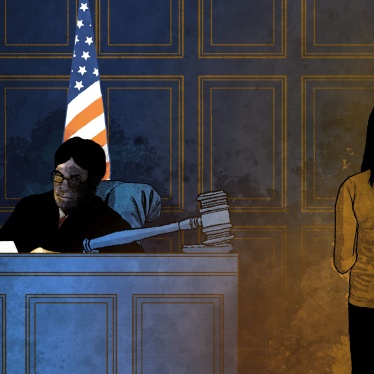(Sacramento) – Approximately 300 youth offenders have been sentenced to die in California’s prisons for crimes committed when they were teenagers, Human Rights Watch said in a report released today. The United States is the only country in the world where people who were under age 18 at the time of their crime serve sentences of life without parole. Nationally, more than 2,500 youth offenders are serving these sentences.
The 28-page report, “When I Die, They’ll Send Me Home: An Update,” draws on six years of research, interviews, and correspondence with correctional officials and youth offenders serving life without parole. Despite mounting evidence of young people’s ability to change, California persists in sentencing youth to life without parole sentences, Human Rights Watch found.
“No one can predict who a teen will be at age 40,” said Elizabeth Calvin, senior children’s rights advocate at Human Rights Watch and author of the report. “When California sentences a 16-year-old to die in prison, the state ignores what science, parents, and teachers have long known: young people have tremendous potential to change, grow, and mature.”
The state is at a critical juncture as the legislature considers a bill that would provide review and the possibility of resentencing in these cases. Senate Bill 9 passed the Senate, but failed by one vote in the Assembly in August 2011. The bill has been amended, and another vote by the Assembly is expected soon, possibly on Monday, March 5, 2012.
If SB 9 becomes law, youth could still be sentenced to life in prison, but would have the opportunity to petition for a change to a parole-eligible sentence. Even then, a minimum of 25 years in prison would be required before an inmate could go before the parole board and petition for parole.
“[T]here’s no doubt in my mind that he should be where he is [in prison],” the mother of a teen sentenced to life without parole told Human Rights Watch. “Just not forever.”
Robert D., a 36-year-old who is serving life without parole for a crime that occurred when he was in high school, said: “They said a kid can’t get the death penalty, but life without parole, it’s the same thing. I’m condemned.”
There is a growing recognition that adolescents are different from adults in ways relevant to criminal behavior. The US Supreme Court stated in recent decisions, “Age is a reality that courts cannot ignore,” and, “Punishments that did not seem cruel and unusual at one time may, in the light of reason and experience, be found cruel and unusual at a later time…”
The bill is supported by numerous and diverse organizations, coalitions, and faith-based groups, and has wide support from editorial boards across the state, including The Sacramento Bee, the San Diego Union-Tribune, the San Jose Mercury News, the Los Angeles Times, the San Francisco Chronicle, and the Ventura County Star.
In California, in 45 percent of 127 cases surveyed, youth who had been sentenced to life without parole had not been the person to physically commit a murder, Human Rights Watch found. They included a youth who stood by the garage door as a lookout during a car theft, a youth who sat in the getaway car during a burglary, and a youth who participated in a robbery in which murder was not part of the plan.
While each of these offenders may have participated in a felony, such as robbery, or aided and abetted a crime, none thought murder would result, and none were the trigger person. Previous research by Human Rights Watch found that an estimated 59 percent of youth serving life without the possibility of parole nationally were first-time offenders.
Many of these crimes are committed by youth under an adult’s influence. Acting under the influence and, in some cases, the direction of an adult cannot be considered a mitigating factor by the sentencing judge in California, and in over half of the cases in which there was an adult co-defendant, the adult received a lower sentence than the juvenile.
California also has one of the worst racial disparity rates in the nation in the use of sentences of life without parole for juveniles. African American youth are sentenced to life without parole at 18.3 times the rate of white youth, and Hispanic youth at 5 times the rate of whites.
California’s policy to lock up youth offenders for the rest of their lives also comes with a significant financial cost. Even if the state stops handing down juvenile life without parole sentences today, the current population with this sentence will cost the state approximately half a billion dollars. Human Rights Watch calculates that since 1990, California has spent between $66 and $83 million incarcerating this population, and the costs will only grow as more youth are sentenced to spend the rest of their lives behind bars.
“California’s use of life without parole for young people is especially unjust,” Calvin said. “Passing this bill sets the stage for more accurate justice, for rehabilitation, and for modernization and streamlining of the criminal justice system.”






